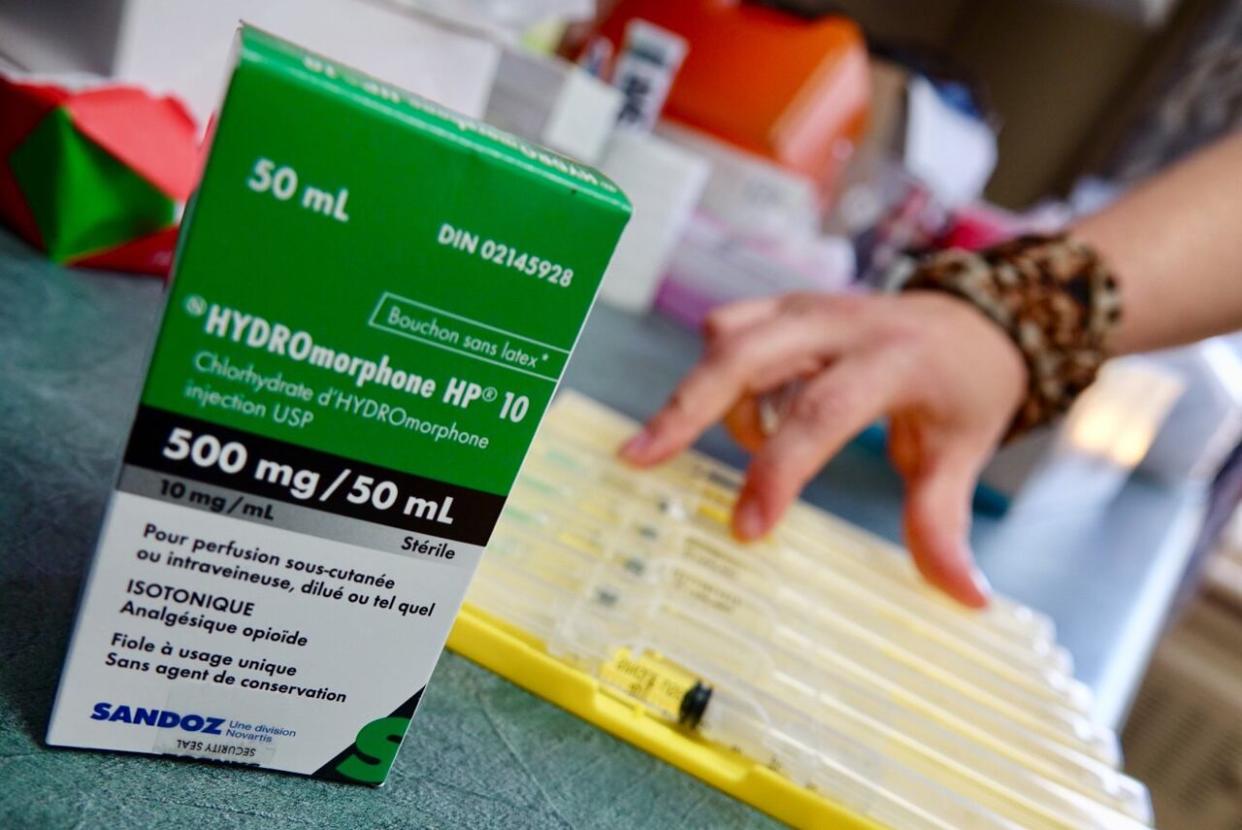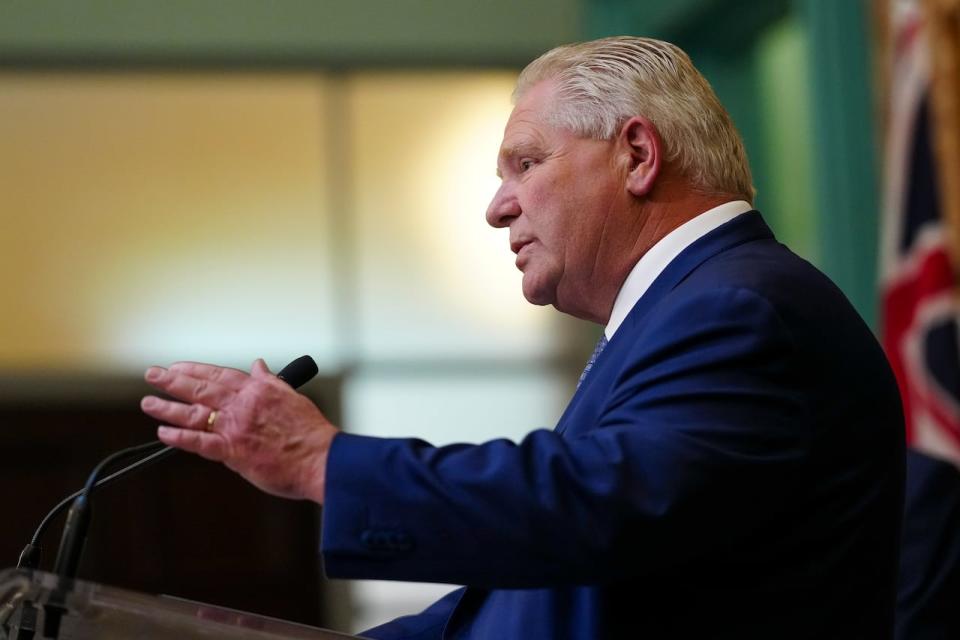Ford calls on Ottawa to end approvals for safe drug supply sites

Ontario Premier Doug Ford called on the federal government Friday to stop approving sites that supply regulated opioids to those living with addiction and launch a review of current locations in the province.
In a letter sent to Prime Minister Justin Trudeau, Ford requested that provincial support be a requirement for the sites, a criteria Trudeau recently said would be attached to any requests for decriminalizing small amounts of drugs for personal use.
Ford said safe supply sites, where medical professionals provide regulated prescription medications as an alternative to illicit and often toxic narcotics, are "approved solely and unilaterally by Health Canada." This has left Ontario "completely in the dark about where these federally approved sites are operating" and the quantity of controlled substances they dispense, Ford said.
"For that reason, I'm calling on the federal government to immediately stop approving new sites and conduct a formal review of existing ones in the province," he said.
Hours after the letter to Trudeau was sent, the federal government announced that it had rejected a request from Toronto to decriminalize the possession of small amounts of illegal drugs for personal use within the city.
Mental Health and Addictions Minister Ya'ara Saks rejected the request due to lingering concerns about safety, according to a statement from Health Canada released Friday.
"She has determined that it does not adequately protect public health and maintain public safety," the statement said.
As for safe supply sites, Health Canada says they help prevent overdoses, ultimately saving lives and connecting drug users to other health and social services.
The federal agency published an interactive map with safe supply locations across Canada that are funded through the Substance Use and Addictions Program, which provides money to other levels of government and not-for-profit groups. There are 16 in Ontario, with all but one in the southern reaches of the province.
Speaking in Winnipeg on Friday, Trudeau said his government is taking a public health and safety approach to the opioid crisis "as opposed to unnecessarily criminalizing and further marginalizing people."
"But no order of government can do this alone," he said. "That's why we're focused on working with people on the front lines, whether it's at the provincial health systems or at the cities, to keep people safe."
He didn't say whether the federal government would pause safe supply approvals or conduct a review of the current sites.
Ford at odds with Ontario's chief medical officer
Ford's letter comes a day after Ontario's minister of health and solicitor general warned Toronto Public Health to drop its bid to decriminalize drugs for personal use in the city. Sylvia Jones and Michael Kerzner said the province intends to enact "enhanced accountability measures" for existing supervised consumption sites following a recent review.
The B.C. government recently received federal approval to recriminalize the use of unregulated drugs in public spaces such as hospitals and restaurants, a major climbdown for the first-of-its-kind pilot in Canada.

Ontario Premier Doug Ford takes part in a press conference at Ottawa City Hall on Monday, April 29, 2024. Ford called on the federal government Friday to stop approving sites that supply regulated opioids to those living with addiction and launch a review of current locations in the province. (Sean Kilpatrick/The Canadian Press)
Ford, in his letter, pointed to B.C.'s experience with decriminalization as a reason for opposing safe supply.
"An earlier review conducted by their provincial health officer also indicated that the diversion of controlled substances obtained at these facilities was a common occurrence, including to trade for more lethal and harmful drugs like fentanyl," Ford wrote.
"It also indicated that diversion is contributing to higher youth opioid use rates and has led to individuals in successful treatment services relapsing due to easy access."
The Ford government's position is also at odds with the province's Chief Medical Officer of Health Dr. Kieran Moore, who has said decriminalization and safe supply will keep thousands more Ontarians from dying of overdoses in the coming years.
In an annual report released in March, Moore noted more than 2,500 people have died annually in Ontario in the past few years due to a drug supply that is increasingly toxic. And the number of opioid-related deaths among teens and young adults in Ontario tripled between 2014 and 2021, he said.
Research points to safe supply programs as the most effective immediate solution, Moore added.
"The system must first take urgent steps to keep people alive, such as creating safe spaces where people can use unregulated drugs and providing regulated pharmaceutical alternatives," Moore wrote in the report.
"With these harm reduction responses in place, people who are using opioids may be in a position to benefit from offers of education and treatment, and to make choices that enable them to reduce or even stop their opioid use," he continued.
Letter tells residents where province stands: strategist
Conservative strategist Alex Chreston, vice president of Crestview Strategy, a public affairs agency, said thinks it's smart for Ford to make his position clear because the public is concerned about drug use.
"Politicians of every stripe now across the country are now starting to backtrack on those policies that have just not panned out," Chreston said on Friday. "The government, I think, is wise to be getting out strongly so that people understand what their position is on this."
Chreston said the position is not a "vote winner," but it signals to people who live near safe supply sites where exactly the government stands on the issue.
Health professionals and advocates say pharmaceutical grade opioids, in the form of hydromorphone pills, are a safer alternative to street drugs.
Opioids have torn through the country over the past decade leaving thousands dead every year. Before that, prescription pills such as oxycodone and Percocets were widely used.
That changed about 10 years ago when synthetic fentanyl, largely created in clandestine labs in China, began hitting the west coast. The opioid crisis slowly spread east. Police in Ontario have noted a rise in homegrown fentanyl labs in recent years.
Ontario's chief coroner has found fentanyl in the vast majority of opioid overdose deaths, often found in a dangerous cocktail with benzodiazepines and, lately, with xylazine, a tranquillizer used by veterinarians on animals.


